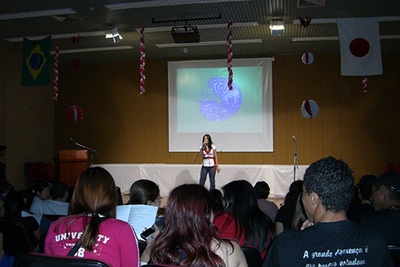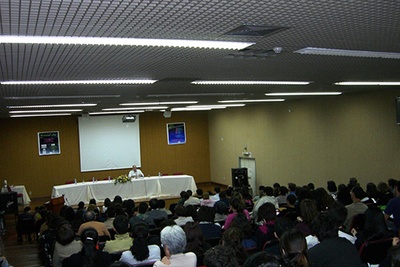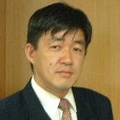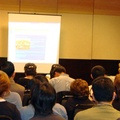Nos dias 30 e 31 de agosto de 2007 foram realizados conjuntamente na Universidade Estadual Paulista da cidade de Assis, o XVIII Encontro Nacional de Professores Universitários de Língua, Literatura e Cultura Japonesa (ENPULLCJ) e o V Congresso Internacional de Estudos Japoneses no Brasil (CIEJ).
O evento reuniu acadêmicos e especialistas em estudos japoneses de diversas partes do Brasil e do exterior. A programação envolveu conferências e comunicações, em que os participantes puderam mostrar, conhecer e discutir os resultados de trabalhos desenvolvidos por professores e especialistas. Houve oportunidade também para os estudantes apresentarem seus trabalhos, por meio de apresentações de pôsteres. O programa contou ainda com os cinco workshops – dois sobre o tema línguas, dois sobre literatura e um sobre cultura – que aconteceram durante os dois dias do encontro.
A grande riqueza e multiplicidade de temas foram uma das marcas positivas do evento, que puderam ser constatadas pelas conferências de Jeffrey Lesser da Universidade de Emory (EUA) que tratou sobre a “Etnicidade nikkei e ditadura brasileira”; de Sakae Ishikawa da Universidade de Sophia (Japão) abordando a obra literária Sobo de Tatsuzo Ishikawa, que descreveu a imigração dos japoneses ao Brasil; a de David Le Quere, pesquisador francês de mangá e anime, apresentou a história do mangá, trazendo fotos e mostrando sua evolução, as transformações das técnicas nos desenhos e a influência da história do Japão sobre as obras; e de Tooru Maruyama da Nanzan University (Japão) que falou do padre João Rodrigues, mostrando um pouco da língua portuguesa e japonesa nos séculos XVI e XVII e suas mudanças até então.
Os workshops foram bastante dinâmicos e interativos, como o da Dra. Mitsuyo Sakamoto, da Universidade de Sophia no Japão, desenvolveu o workshop O bilinguismo no contexto familiar, no qual contou um pouco da sua própria experiência. Relatou as dificuldades e os ganhos de se viver em um contexto bilíngüe. Nascida no Japão e membro de uma família japonesa, mudou-se para a Canadá ainda pequena. No ambiente familiar falava somente em japonês e fora de casa só falava em inglês. Outro workshop que contou com a participação do público foi o Sôkyoku como introdução à apreciação da música clássica japonesa, no qual os participantes tiveram a oportunidade de cantarem a música japonesa e experimentarem tocar o “Koto”, instrumento musical de origem japonesa e que de acordo com a professora Alice Lumi Satomi, apresenta sonoridade e recursos que seriam semelhantes ao da harpa. Por isso, é um dos instrumentos mais propensos a serem aceitos no ocidente.
Após a última conferência, foi feita a apresentação do relatório de atividades da Associação Brasileira de Estudos Japoneses (ABEJ), destacando a importância das parcerias, como com a Fundação Japão, para o desenvolvimento das atividades realizadas ao longo dos últimos anos. E destacou o último convênio, realizado com o site Discover Nikkei, para o qual convidou todos os presentes a participarem.
O evento, entretanto, não se restringiu apenas aos assuntos acadêmicos e também propiciou aos participantes oportunidades de confraternização, com um agradável jantar ao fim do primeiro dia de evento. Para finalizar o encontro, realizou-se o III Festival de Música Japonesa, organizado pelos alunos de Assis, no qual cantaram músicas e fizeram divertidas apresentações, animando o público presente.
O XVIII ENPULLCJ e V CIEJ tiveram uma agenda repleta de informações e atividades, ao mesmo tempo substancioso e prazeroso para todos aqueles que se interessam pelos estudos japoneses e, por isso, já fica aberto o convite para o evento que será realizado no próximo ano na Universidade Federal do Rio de Janeiro.
*Associação Brasileira de Estudos Japoneses (ABEJ), afiliada ao Descubra Nikkei, contribui com este artigo para a Descubra Nikkei. ABEJ é uma organização sem fins lucrativos que congrega professores e pesquisadores de diferentes áreas de conhecimento sobre o Japão, especialistas,estudantes e pessoas interessadas em questões japonesas.
© 2007 Alexandre Ratsuo Uehara e Mary Maruyama







